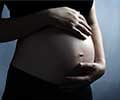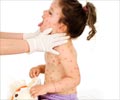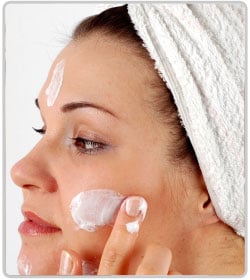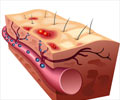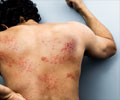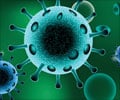Treatment for Chickenpox
Isolation of the patient for about 6 days after the onset of rashes and disinfecting the articles soiled by nose and throat discharge of the patient are the usual control measures.
- Treatment mostly consists of easing the symptoms.
- In serious cases of chickenpox and in people with a weak immune system, aciclovir which works specifically against chickenpox can be used. The drug should help reduce the severity of chickenpox symptoms, especially in older children and teenagers if taken within 24 hours of the rash's first appearance. An alternative antiviral agent is vidarabine.
- The infected person will be contagious until all the blisters have scabs and when new blisters have stopped appearing. It is advised that the patient should stay at home while they are infectious.
- Avoid scratching the blisters because of the risk of infection.
- Cut the nails short or make the patient wear gloves.
- Pay attention to personal hygiene.
- Calamine lotion will help relieve itching.
- Keep the patient in cold surroundings as heat and sweat may make the itching worse.
- In attacks of chickenpox where the itching is so serious that the child's sleep is totally disturbed, antihistamine medications with a heavily sedative effect can be used.
Chickenpox Vaccine
Chickenpox or varicella vaccine is a shot that can protect an individual from catching chicken pox. Chickenpox vaccine is made from a live but weakened varicella zoster virus. Chickenpox vaccine is recommended for children under the age of 13 who have not had chicken pox. It is also recommended for adults who have not been vaccinated and contracted the disease. Contraindicated in pregnant women, children or adults with weakened immune system, allergic to neomycin, people who have received high doses of steroids, who had blood transfusion or received blood products within five months prior to the shot.
Chickenpox Vaccine Dosage
Children should receive two doses of the vaccine.
- The first dose should be given when the child is 12 - 15 months old.
- A second dose should be given when they are 4 - 6 years old. This second dose can be given before age 4, as long as 3 months have passed since the first dose.
People aged 13 and older who have not received the varicella vaccine and have not had Chickenpox should get two doses, 4 and 8 weeks apart. People (aged 13 and older) who have had a previous dose and have not had the disease should receive a second dose.
Side Effects of Chickenpox Vaccine
Side effects from the chickenpox/varicella vaccine are generally mild and include pain and swelling at the injection site, mild rash, fever. Moderate or severe side effects are very rare and include severe allergic reaction, pneumonia, seizures.

